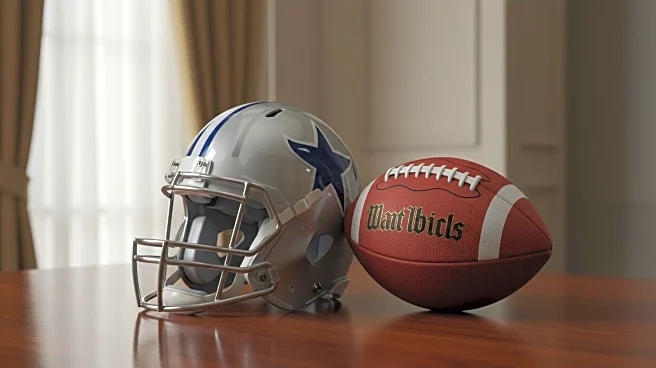What's Happening?
Lamar Jackson, the quarterback for the Baltimore Ravens, has concluded a yearlong legal dispute with former NFL quarterback Troy Aikman over trademark rights. The disagreement centered around Aikman's use of the word 'EIGHT' on various products, which Jackson argued could confuse consumers due to his own trademarks involving the number 8, such as 'Era 8' and 'You 8 yet?'. Jackson withdrew his opposition with prejudice, meaning he cannot refile the case, as confirmed by the U.S. Patent and Trademark Office's appeal board. This decision allows Aikman's company, FL101, to proceed with its branding. The withdrawal follows several unfavorable decisions for Jackson from the Trademark Trial and Appeal Board.
Why It's Important?
The resolution of this trademark dispute is significant for both parties involved. For Troy Aikman, it means his company can freely use the branding it applied for, potentially expanding its market presence with products like apparel and energy drinks. For Lamar Jackson, the withdrawal marks a strategic retreat in his broader trademark strategy, which has seen him challenge other athletes over similar issues. This outcome may influence how athletes approach trademark disputes in the future, particularly regarding the use of numbers and associated branding. The decision also highlights the complexities of trademark law in sports marketing and the potential for consumer confusion.
What's Next?
With the legal dispute resolved, Troy Aikman's company can now focus on marketing and distributing its products without the looming threat of legal challenges from Jackson. For Jackson, this may prompt a reassessment of his trademark strategy, especially in light of recent unfavorable decisions. It remains to be seen if Jackson will pursue other trademark challenges or shift his focus to different branding opportunities. The resolution may also encourage other athletes to carefully consider their trademark filings and potential conflicts with existing brands.
Beyond the Headlines
This case underscores the growing importance of intellectual property rights in sports, where branding and merchandise play a crucial role in revenue generation. The dispute highlights the balance athletes must strike between protecting their brand and avoiding overreach in trademark claims. It also raises questions about the ethical implications of trademarking common numbers and phrases, which could limit creative expression and market competition. As athletes increasingly seek to monetize their personal brands, similar legal battles may become more common, prompting discussions about the boundaries of trademark law.











